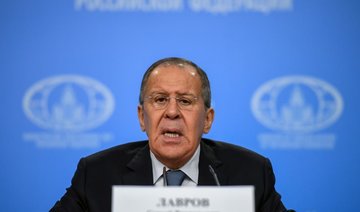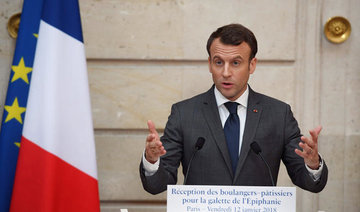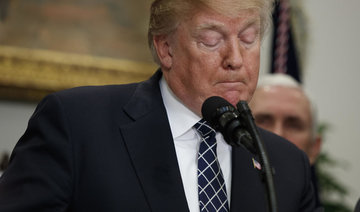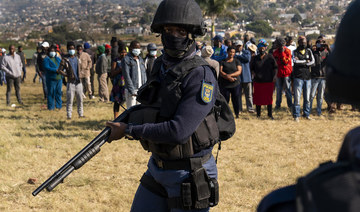TEHRAN: The US’ new nuclear policy brings humanity “closer to annihilation,” Iran’s Foreign Minister Mohammad Javad Zarif has said.
His comments late Saturday came a day after the Pentagon revealed plans to revamp its nuclear arsenal, largely in response to a perceived renewed threat from Russia.
Zarif said the new policy was “in violation” of the international Nuclear Non-Proliferation Treaty (NPT).
“The US Nuclear Posture Review reflects greater reliance on nukes in violation of the #NPT, bringing humankind closer to annihilation,” Zarif said on Twitter.
Zarif said the same impulse was driving the United States to undermine the 2015 nuclear deal with Iran, which President Donald Trump has demanded be renegotiated.
Iran also accused the US on Sunday of threatening Russia with new atomic weapons.
“The Americans are shamelessly threatening Russia with a new atomic weapon,” Iranian President Hassan Rouhani, a pragmatist who opened the way to Tehran’s 2015 nuclear deal with world powers including longtime adversary Washington, said in a speech.
“The same people who supposedly believe that using weapons of mass destruction is a crime against humanity ... are talking about new weapons to threaten or use against rivals,” he said in his televised address.
Meanwhile, Zarif wrote: “Trump’s obduracy in killing the #JCPOA stems from the same dangerous imprudence,” using the technical name for the nuclear deal.
The latest Nuclear Posture Review published by the Pentagon called for a larger arsenal of smaller, low-yield nuclear weapons to act as a more “credible” deterrent to threats, particularly from Russia.
The NPT, which came into force in 1970 and has been signed by almost all countries including the United States, calls on nations “to achieve at the earliest possible date the cessation of the nuclear arms race and to undertake measures in the direction of nuclear disarmament.”
President Hassan Rouhani took a similar line in a speech on Sunday, saying it showed US hypocrisy in opposing Iran’s missile program.
“You see the kind of insolent language Americans are using with Russia, threatening them with new nuclear weapons,” Rouhani said in the televised speech.
“How can they then say this is a time of peace, brotherhood and coexistence, and we don’t need defensive power? We will always be in need of a defensive power.”
Iran’s nuclear deal, reached with six world powers, lifted some international sanctions in exchange for curbs to its nuclear program.
But Trump has consistently attacked the accord and said in January he would not continue to waive sanctions unless new restrictions were placed on Iran’s missile program and wider actions in the Middle East.
The other parties — Britain, France, Germany, Russia and China — as well as the European Union have strongly defended the deal, saying it has achieved its aim of limiting Iran’s ability to build a nuclear weapon.
Iran says US nuclear policy brings world ‘closer to annihilation’
Iran says US nuclear policy brings world ‘closer to annihilation’

Russia invites Afghanistan’s Taliban to major economic forum

- Russia has been slowly building ties with the Taliban, though the movement is still officially outlawed in Russia
- In 2003, Russia formally labelled the Taliban a terrorist organization, though it had periodic informal contacts with them
MOSCOW: Russia has invited Afghanistan’s Taliban to its biggest annual economic forum as Moscow moves to remove a ban on the Islamist movement, a senior Russian diplomat was quoted as saying on Monday.
Since the Taliban seized power in August 2021 as US-led forces withdrew after 20 years of war, Russia has been slowly building ties with the Taliban, though the movement is still officially outlawed in Russia.
Russia’s foreign and justice ministries have reported to President Vladimir Putin on the issue of removing the ban, Zamir Kabulov, director of the Second Asia Department at the Russian Foreign Ministry, told state news agency TASS.
Some questions remain, Kabulov was quoted as saying, though he said that an invitation to attend the June 5-8 St. Petersburg international economic forum had been extended to the Taliban.
Afghan leaders, he said, were traditionally interested in the purchase of oil products.
The St. Petersburg forum, which once hosted Western CEOs and investment bankers from London and New York, has changed significantly amid the Ukraine war which has triggered the biggest crisis in Russia’s relations with the West since the 1962 Cuban Missile Crisis.
Western investors seeking a slice of Russia’s vast resource wealth have now been replaced by businesses from China, India, Africa and the Middle East.
The Taliban, which means “students” in the Pashto language, emerged in 1994 around the southern Afghan city of Kandahar. It was one of the factions fighting a civil war for control of the country following the withdrawal of the Soviet Union and subsequent collapse of the government.
It originally drew members from so-called “mujahideen” fighters who, with support from the United States, repelled Soviet forces in the 1980s.
In 2003, Russia formally labelled the Taliban a terrorist organization, though it had periodic informal contacts with the movement.
Spain’s prime minister says Cabinet to recognize a Palestinian state

- ‘This is a historic decision that has a single goal, and that is to help Israelis and Palestinians achieve peace’
- While dozens of countries have recognized a Palestinian state, none of the major Western powers has done so
MADRID: Prime Minister Pedro Sanchez said the Spanish Cabinet will recognize a Palestinian state at its Tuesday morning meeting as a European Union rift with Israel widens.
Ireland and Norway were also to make official their recognition of a Palestinian state later in the day. While dozens of countries have recognized a Palestinian state, none of the major Western powers has done so.
“This is a historic decision that has a single goal, and that is to help Israelis and Palestinians achieve peace,” said Sanchez, standing at the gates of the prime minister’s palace in Madrid, during a televised speech.
The Socialist leader, who announced his country’s decision before parliament last week, has spent months touring European and Middle Eastern countries to garner support for recognition and a ceasefire in Gaza.
Relations between the EU and Israel nosedived Monday, the eve of the diplomatic recognition EU members Ireland and Spain, with Madrid insisting that the EU should take action against Israel for its continued deadly attacks in southern Gaza’s city of Rafah. Norway, which is not an EU member but often aligns its foreign policy with the bloc, handed diplomatic papers to the Palestinian government over the weekend ahead of its formal recognition of a Palestinian state.
Israeli Foreign Minister Israel Katz told Spain that its consulate in Jerusalem will not be allowed to help Palestinians.
At the same time, the EU’s foreign policy chief Josep Borrell threw his weight to support the International Criminal Court, whose prosecutor is seeking an arrest warrant against Israeli Prime Minister Benjamin Netanyahu and others, including leaders of the Hamas militant group. In his speech on Tuesday, Sanchez said that the recognition of a Palestinian state was “a decision that we do not adopt against anyone, least of all against Israel, a friendly people whom we respect, whom we appreciate and with whom we want to have the best possible relationship.”
He called for a permanent ceasefire, for stepping up humanitarian aid into Gaza and for the release of hostages that Hamas has held since the Oct. 7 attack that triggered Israel’s response.
Sanchez also laid out his vision for a state ruled by the Palestinian National Authority that must connect the West Bank and Gaza with East Jerusalem through a corridor.
“We will not recognize changes in the 1967 border lines other than those agreed to by the parties,” Sanchez added.
India’s space startup calls off maiden rocket launch for fourth time

- Launches of India’s second privately built rocket had been aborted three times before because of technical issues
- Cosmos’ Agnibaan is customisable, 2-stage launch vehicle that can take up to 300 kg of payload to orbits 700 km in altitude
BENGALURU: India’s Agnikul Cosmos called off a test flight of its first rocket on Tuesday seconds before it was due to launch — the fourth such cancelation in the last three months.
Launches of India’s second privately built rocket, and first using a combination of gas and liquid fuel, had been aborted three times before because of technical issues, including one flight that was canceled about 90 seconds before lift-off.
The launch, scheduled for 5:45 a.m. IST (0015 GMT) on Tuesday, was first delayed less than six minutes before lift-off “due to a technical glitch in the countdown activities,” and officials set a new lift-off time of 9:25 a.m.
Only five seconds before lift-off, however, the launch was put on “temporary hold to check igniter performance,” then was called off altogether.
The mission was expected to last two minutes and test the new “semi-cryogenic” engine and 3D-printed parts. If successful, it would have represented a technological step for India, whose Indian Space Research Organization (ISRO) has not yet successfully flown a semi-cryogenic engine, which uses a mix of liquid and gas for propellant.
Agnikul Cosmos’ Agnibaan rocket is a customisable, 2-stage launch vehicle that can take up to 300 kg (about 660 lb) of payload to orbits about 700 km in altitude (435 miles), the company said. SpaceX’s Falcon Heavy can put up to 63,500 kgs to low Earth orbit.
India’s first privately developed rocket, from the company Skyroot, was flown from ISRO’s launch site in 2022.
Founded in 2017, Agnikul — whose name is derived from the Hindi and Sanskrit word for fire — runs the country’s first private launchpad and mission control center, while ISRO operates all other launchpads.
Cyclone kills 16 in India, Bangladesh and cuts power to millions

- Cyclone Remal is first of frequent storms expected to pound low-lying coasts of South Asian neighbors this year
- More than 8.4 million people, including 3.2 million children, at high health, nutrition, sanitation, safety risk
SATKHIRA, Bangladesh: Strong gales and heavy rain triggered by the first major cyclone of the year lashed the coastlines of India and Bangladesh on Monday, killing at least 16 people and cutting power to millions.
The winds had not stopped as night fell, with water rising in many places and overwhelming drainage systems, Bangladeshi climate expert Liakath Ali said.
“Many people are stranded — it will be another long night ahead with millions not having electricity or shelter,” he said in a statement. “And people having no idea of how damaged their homes, land and livestock are.”
Cyclone Remal is the first of the frequent storms expected to pound the low-lying coasts of the South Asian neighbors this year as climate change drives up surface temperatures at sea.
Packing speeds of up to 135 kph, it crossed the area around Bangladesh’s southern port of Mongla and the adjoining Sagar Islands in India’s West Bengal late on Sunday, weather officials said, making landfall at about 9 p.m.
More than 8.4 million people, including 3.2 million children, are at high health, nutrition, sanitation and safety risk, said Sheldon Yett, UNICEF Representative to Bangladesh.
At least 10 people were killed in Bangladesh, disaster management chief Mijanur Rahman told Reuters, adding some victims died en route to shelters or when their homes or walls collapsed, or drowned during the storm.
“People are usually very reluctant to leave their livestock and homes to go to cyclone shelters,” he said. “They wait until the last minute when it is often too late.”
State Minister for Disaster Management and Relief Mohibbur Rahman said the cyclone destroyed nearly 35,000 homes across 19 districts. An additional 115,000 homes were partially damaged.
“Many areas remain waterlogged, and fish enclosures and trees have been devastated. As more information becomes available, the full scope of the impact will be clearer.”
MANGROVE FORESTS FLOODED
In India’s West Bengal state, four people were electrocuted, authorities said, taking the death toll in the state to six.
Bangladesh shut down electricity supply to some areas in advance to avoid accidents, while in many coastal towns fallen trees and snapped electricity lines further disrupted supply, power ministry officials said.
Nearly 3 million people in Bangladesh were without electricity, officials added. West Bengal authorities said at least 1,200 power poles were uprooted, while 300 mud huts had been razed.
Bangladeshi State Minister for Power and Energy Nasrul Hamid said in a Facebook post that Remal has caused extensive damage nationwide, urging people to be patient as repairs were under way.
“Our crews began repairing the lines as soon as the wind speed subsided,” he said.
The cyclone also disrupted around 10,000 telecom towers, leaving millions without mobile service.
The rain and high tides damaged some embankments and flooded coastal areas in the Sundarbans, home to some of the world’s largest mangrove forests, which are shared by India and Bangladesh.
Flooded roads disrupted travel in the Bangladeshi capital of Dhaka. Rain also flooded many streets in the Indian city of Kolkata, with reports of wall collapses and at least 52 fallen trees.
Kolkata resumed flights after more than 50 were canceled from Sunday. Suburban train services were also restored.
Both nations moved nearly a million people to storm shelters, about 800,000 in Bangladesh and roughly 110,000 in India, authorities said.
Zuma’s party guns for ANC stronghold in South Africa vote

- The emergence of uMkhonto we Sizwe, has increased tension in Kwazulu-Natal, a key election battleground already infamous for political violence
KWAXIMBA, South Africa: In a village nestled in the mountains of South Africa’s hotly-contested Kwazulu-Natal province, former President Jacob Zuma’s new party has campaigned relentlessly to win voters away from his old one, the ruling ANC.
On Monday, rival tents pitched by the two parties outside a local school serving as a polling station blasted party songs welcoming early voters they hoped to sway.
Most South Africans will vote on Wednesday but some, including the elderly and the infirm, were allowed to cast their ballots on Monday in what is expected to be the tightest election in decades.
The emergence of Zuma’s uMkhonto we Sizwe (MK), has increased tension in Kwazulu-Natal, a key election battleground already infamous for political violence.
KwaXimba, a rural area dotted by thatched “rondavel” huts outside the eastern city of Durban, has been ruled by the African National Congress (ANC) since the dawn of democracy in 1994.
But many here revere Zuma, an ethnic Zulu, who was born in the province.
“We’ve needed change for a long time in our lives,” said Thokozani Mthembu, the MK’s local coordinator in KwaXimba.
Some opinion polls suggest that MK could win the most votes in Kwazulu-Natal. This would almost certainly condemn the ANC to its worst electoral result in three decades.
It could lose its parliamentary majority for the first time and be forced to form a coalition government.
Voting proceeded smoothly in KwaXimba during the day, but in a tense atmosphere.
Mthembu claims that after Zuma, 82, held a rally with hundreds of supporters in KwaXimba in January, the party received threats of violence from ANC supporters. Some voters were also wrongly told that the MK would take away social grants and free housing, he said.
The ANC denies all wrongdoing.
“From the day we started our campaign, we’ve had one goal, which is to win the election without threatening other parties,” Sihle Gwala, a local ANC leader, told AFP.
Earlier this month, police warned against “spreading statements that have a potential of inciting violence or create a state of panic in the communities” after a voice note circulated claiming that 11 people were killed in a politically-related shooting.
Many in KwaXimba have turned to the MK, lamenting continuous water and electricity shortages, which some blame on the ANC’s poor management.
Down the road from the school, chickens clucked in 66-year-old Nicolas Ndlovu’s yard, as he walked outside, waiting for election officials to reach his home and allow him to cast his early ballot.
Having fought for the ANC during the anti-apartheid struggle and supported the party all his life, he said he now hoped to see it end up in opposition, so that “maybe they can work harder and earn the power back.”
His village’s streets, where cows roam under the sun, are plastered by campaign posters of the rival parties.
ANC volunteer Jabulile Nduna said the rift between Zuma and her party has caused divisions within her own family.
“I sat (down) my siblings and told them, ‘at the end of the day we have one mother and one father’... whether the MK wins or the ANC wins, we have to remain a family,” said the 43-year-old mother of three, as she walked on a gravel road near a voting station.
During a campaign visit to KwaXimba last month, President Cyril Ramaphosa warned voters about new parties trying to “nibble the edges” of ANC support, saying they would fail to win power.
But some like Nkazimula Makhanya are not heeding the call.
At 26 he has no job and few prospects of getting one, with youth unemployment at 45 percent.
“The old man, as old as he is, he still values our input, and he still allows us to be winners,” he said, referring to Zuma.
















